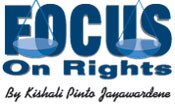‘Unuth ekai, munuth ekai’
View(s):The sequence of events leading to the proposed impeachment of the Chief Justice Shirani Bandaranayake is reminiscent of the pithy Sinhala saying “Unuth ekai, munuth ekai, thopith ekai (They’re all the same).” JR (Jayewardene) did it and now MR (Mahinda Rajapaksa) is doing it!
JR (Sri Lanka’s first Executive President in 1978) appointed Neville Samarakoon from the unofficial bar as the Chief Justice and contrary to his (JR’s) expectation the Chief Justice was critical of certain, allegedly arbitrary actions of the Executive and made his concerns known at an innocuous event which triggered a major crisis and led to an impeachment. But Samarakoon stepped down, sending his papers for retirement.
Now that an impeachment motion has been presented to the Speaker, Chamal Rajapaksa, brother of the President, the next step is for a committee to be appointed under the Standing Orders of Parliament. Such a body will invariably comprise mostly government MPs and the result of the probe to ascertain whether or not there is a prima facie case against the Chief Justice, is a foregone conclusion.
We are not alone in saying it but most Sri Lankans who remember the late 1970s and the periods after that recall the untrammeled power of the Executive used for any and every situation to protect that individual’s continuance in powers. The holder of this position was expected to use these powers wisely. It has always been and (gut feeling) would continue to be a situation where the individual voted into office uses these powers for his or her own advantage, often to the disadvantage of the people.
While the merits and demerits of the Chief Justice’s alleged actions would now be discussed in full in public and the media – newspapers/radio/televisions and endless talk-shows next week -, what is sacrosanct is the protection of the institutions – Executive, Parliament and the Judiciary.
The structures laid down by the Constitution are meant to protect the sovereignty of the people and if individuals holding these positions, use it for their personal needs, then the system breaks down and anarchy takes over from the rule of law. Already that is happening in this mindless pursuit given the fact that action against the Chief Justice is based on political considerations.
Another issue of concern is the way relatively junior government MPs handled a highly, sensitive issue at a media briefing on Thursday which included government media spokesman Keheliya Rambukwella, where jokes and banter were the order of the day. When attempts were being made to remove Pakistan’s chief justice in March 2007 by then President, General Pervez Musharraf, bloodshed spilled on the streets with lawyers and civil society activists clashing with police and security forces.
Here proponents of the impeachment (if one is to believe that the most junior members of the government are the prime movers) laughed and joked about an issue that has face-reaching repercussions for the nation, not only locally but overseas.
In Pakistan, Musharraf summoned the chief justice to his army headquarters, removed him as chief justice and placed him effectively under house arrest on grounds of “misconduct and misuse of authority.”
The Business Times poll this week on the crisis clearly reflects growing unease over the situation. Never has there been a successful removal of the chief justice through an impeachment in Parliament though there have been attempts in the past including one against Sarath Silva (by the UNP).
The drama comes on the eve of the budget raising another question: Is this a diversionary tactic by the government? Economic woes continue, economic growth is coming down and government borrowing is on the increase. Most people expect some relief in the budget though already the government has accounted for a large segment of the revenue through pre-budget increases on taxes on essential consumer goods. Is the motion a ruse to divert serious issues in the budget, asked an economist.
The President won’t be presenting the budget, as he did last year, since he would be abroad. Instead Sarath Amunugama, who was appointed deputy finance minister under a minor reshuffle, will do the honours on budget day – November 8. Should one read something into these changes; the President being away on an occasion that he normally is fully involved in, changes at the finance ministry and the impeachment being presented? Questions are being raised even if it’s more coincidental that these developments are taking place at the same time.
The argument that – they (UNP) did it and so why not we (government) – is baseless if Sri Lanka’s leaders are truly protecting the rights of the people or working on their (repeat) their behalf. Two wrongs don’t make a right. What is wrong is wrong; it cannot be justified under any circumstances.
Institutions like the Executive, Parliament or the Judiciary must be protected as they ensure (or must ensure) the rights of the people; not that of individuals whoever they may be. Trust is bestowed on these institutions by the people to function within the framework of the law as prescribed in the Constitution, the country’s supreme law.
If that doesn’t happen, anarchy takes over and to some extent that has happened. Some months ago, these were danger signals; now it is real.
Follow @timesonlinelk
comments powered by Disqus
























